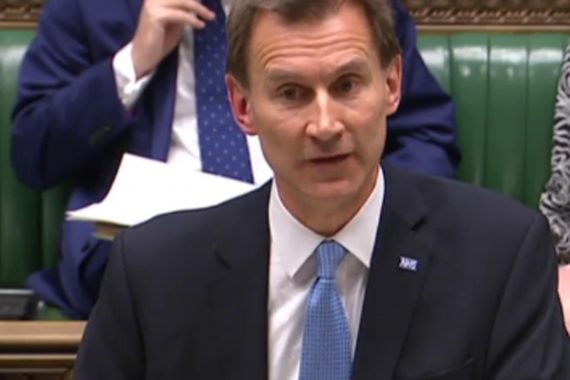Some GP practices in England will be extending their opening hours to help deal with extra demand resulting from the junior doctor strikes on Tuesday and Wednesday, the health secretary has claimed.
In a statement to the House of Commons on Monday afternoon, in which he defended his imposition of the junior doctor contract, Jeremy Hunt also pleaded directly with junior doctors ‘not to withdraw emergency cover’ during the all-out junior doctor strike days tomorrow and Wednesday.
Mr Hunt said: ’NHS England has… asked GP practices and other primary care providers in some areas to extend their opening hours so patients can continue to get the important, but non-emergency, care such as follow-ups and assessments, they need.’
It comes as NHS England has told the public there will be additional GP appointments available during the strike.
In a press release picked up by national news outlets including the BBC, NHS England said there would be ‘extra primary care and GP response/appointment availability’ when junior doctors withdraw all labour – including urgent and emergency care – for the first time in the history of the NHS.
This comes after NHS England regional teams told practices not to pre-book appointments on the days of the strike to ensure there was capacity for extra patients.
But at the same time, advice published by the NHS last week said patients should ‘contact [their GP] early if you need advice or an appointment’ during the strike because of expected high demand.
NHS England’s press release said: ‘NHS England has also ensured other parts of the health service are supporting hospitals and patients during this busy time with extra resources provided to address local pressures.
‘As a result there will be extra primary care and GP response/appointment availability during the strike. Individual practices will decide what additional resource is made available.’
But the GPC said it was not aware of any extra resource for general practice to cover the strike days.
GPC deputy chair Dr Richard Vautrey told Pulse: ’This links to the previous encouragement from NHS England last week to practices to limit pre-booking of appointments and enable greater opportunity for on the day booking.
’I’m not aware of any “extra” primary care but as always practices will respond to the needs of their patients this week as every week.’
The news comes after Jeremy Hunt rejected a cross-party proposal, backed by Tory MP and former health minister Dr Daniel Poulter, to avert the strike action by promising to pilot the contract changes before imposing them.
The letter, signed by shadow health secretary Heidi Alexander (Labour), former health ministers Norman Lamb (Liberal Democrats) and Mr Poulter, and SNP health spokesperson Dr Philippa Whitford, argued that the decision to impose the contract comes despite ‘the lack of any robust research proving a causal link’ between junior doctor staffing and increased mortality in patients admitted at weekends.
It said: ‘If it remains your intention to introduce this new contract, we believe it should be piloted in a number of trusts/across a number of deaneries and for its impact on patients, staff and the “weekend effect” to be independently evaluated.’
But, responding yesterday via Twitter, Mr Hunt said: ‘Labour “plan” is opportunism – only 11% of junior docs go onto new contracts in August. We’re staging implementation to ensure it works as intended. Any further delay just means we will take longer to eliminate weekend effect.’
In his address to Parliament, Mr Hunt added: ’I wish to appeal directly to all junior doctors not to withdraw emergency cover which creates particular risks for accident and emergency, maternity units and intensive care units.’
Pulse contacted the Department of Health and NHS England, neither of which was able to say in which areas GP practices would be extending their hours.
A historic walkout
The 48-hour industrial action planned for 26 and 27 April is historic because it is unprecedented within the NHS for doctors to withdraw all labour including emergency care.
Announcing the plans last month, the BMA’s junior doctor committee Dr Johann Malawana said the Government had left them with ‘no choice’.
Health secretary Jeremy Hunt announced in February that he was imposing a contract on junior doctors, and junior doctors have already staged four rounds of action in protest, during which they did provide urgent and emergency care.
The action is backed by a BMA ballot in which 98% of junior doctors supported strike action, including a potential all-out strike.
Talks between the Government and BMA broke down over the issue of evening and weekend pay, with the Government refusing to step back from its decision to remove ‘unsociable hours’ pay premiums from Saturdays and weekday evenings.
The BMA is also taking the Government to judicial review, arguing that the Government failed to carry out an equality impact assessment before the imposition.
Pulse October survey
Take our July 2025 survey to potentially win £1.000 worth of tokens














